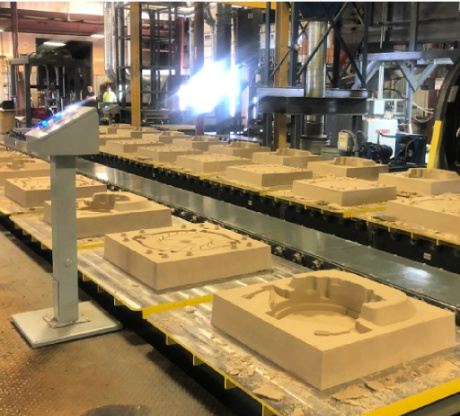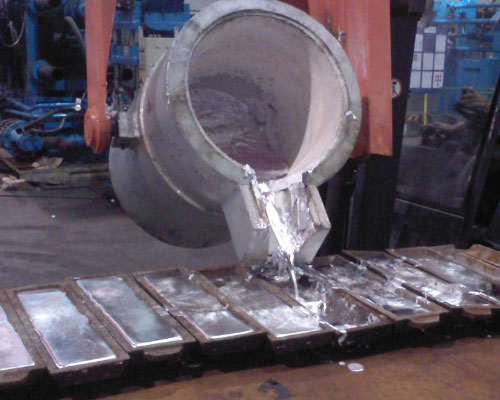The Relevance of Aluminum Foundry ahead of time Industrial Production Techniques
The Aluminum Foundry plays a critical function in the evolution of industrial manufacturing techniques. Its lightweight residential or commercial properties and adaptability make Aluminum an excellent selection for numerous applications. Advanced casting methods, including die casting and 3D printing, permit for detailed designs and mass manufacturing. As the sector moves towards automation and sustainability, inquiries emerge concerning the future trajectory of Aluminum factories and their influence on producing performance. What obstacles and developments lie in advance?
The Function of Aluminum in Modern Manufacturing
Aluminum plays a critical duty in modern-day manufacturing due to its distinct residential or commercial properties and adaptability. As a light-weight steel, it significantly reduces the general weight of items, improving gas performance in transport and aerospace sectors. Its excellent corrosion resistance assurances durability and reliability, making it ideal for various applications, from automotive elements to building products. Aluminum's pliability permits it to be quickly shaped into complex designs, facilitating ingenious item advancement. In addition, its conductivity makes it suitable for electric applications, adding to advancements in electronics and eco-friendly power technologies. The flexibility of Aluminum likewise reaches its recyclability, which adds to lasting manufacturing practices. As sectors remain to focus on performance and environmental obligation, Aluminum continues to be a vital material, cultivating development and improving manufacturing processes across numerous fields. Its function is not simply practical; it is fundamental to the development of contemporary commercial methods.
Key Advantages of Aluminum Casting
The benefits of Aluminum spreading are significant, contributing to its popularity in various commercial applications. One key advantage is the light-weight nature of aluminum, which decreases transportation expenses and boosts gas performance in vehicle and aerospace industries. In addition, aluminum's excellent deterioration resistance prolongs the life expectancy of cast elements, making them optimal for marine and outdoor atmospheres.
On top of that, Aluminum spreading permits detailed designs and intricate geometries, offering makers with better adaptability in item advancement - Aluminum Foundry. The material additionally shows excellent thermal and electric conductivity, making it appropriate for a variety of electronic applications
One more advantage is the fast solidification procedure, which brings about finer microstructures and enhanced mechanical buildings. Aluminum can be reused repetitively without losing its intrinsic qualities, promoting sustainability in manufacturing methods. These advantages emphasize Aluminum spreading's crucial duty in advancing commercial production strategies while meeting diverse design needs.
Cutting-edge Casting Strategies and Technologies
Many innovative casting techniques and technologies have actually emerged to boost the efficiency and top quality of Aluminum production. Amongst these, die casting attracts attention as a technique that enables high-volume production of complicated shapes with excellent dimensional precision. This method utilizes high stress to infuse molten Aluminum into a mold, causing smooth surfaces and decreased demand for machining.
An additional significant development is making use of 3D printing for mold and mildews, which enables fast prototyping and reduces preparations significantly. This modern technology enables elaborate styles that typical methods may struggle to attain.
Additionally, financial investment casting continues to progress, making use of sophisticated products and processes to create precision elements. The fostering of computer system simulations in the casting procedure has actually further enhanced results by forecasting possible defects and enhancing mold styles. Together, these technologies are transforming Aluminum shops, leading the way for more efficient production and superior product high quality in numerous industries.
Environmental Impact and Sustainability in Aluminum Foundries
As sectors progressively focus on sustainability, the ecological impact of Aluminum foundries has actually come under analysis. These centers are significant factors to greenhouse gas emissions and power consumption, largely as a result of the energy-intensive processes involved in melting and casting aluminum. The extraction of bauxite, the main ore, additional aggravates environmental problems, resulting in habitat damage and air pollution.
In reaction to these difficulties, several Aluminum factories are taking on much more lasting practices (Aluminum Castings). Advancements such as reusing scrap Aluminum substantially reduce power usage and discharges, as reusing calls for only a portion of the energy required for key manufacturing. Furthermore, the integration of eco-friendly power sources, such as solar and wind power, is acquiring traction in factories aiming to lower their carbon footprint
Improvements in modern technologies that decrease waste and improve source performance are ending up being essential for the future of the Aluminum market. These check efforts underscore the shift towards a much more ecologically liable and sustainable strategy in Aluminum factories.
Applications of Aluminum Spreading Throughout Industries
Aluminum casting discovers extensive application throughout varied sectors, owing to its desirable homes such as light-weight, rust resistance, and exceptional machinability. In the auto field, makers utilize Aluminum spreadings for engine elements, transmission housings, and structural parts, enhancing fuel performance and efficiency. The aerospace market benefits from light weight aluminum's strength-to-weight ratio, utilizing it in airplane frames and parts, which add to lowered overall weight and enhanced fuel economy.
Furthermore, the customer electronics industry uses Aluminum castings for housings and framework, incorporating visual appeal with sturdiness. In construction, Aluminum castings are used for home window structures, doors, and architectural components, giving both functionality and style flexibility. Additionally, the marine market uses Aluminum spreading for boat hulls and installations, making certain resistance to saltwater corrosion. This adaptability across different areas highlights Aluminum casting's important role in contemporary industrial applications, driving technology and efficiency.
Difficulties Dealt With by Aluminum Foundries
Aluminum foundries experience considerable difficulties in meeting strict ecological laws while preserving operational effectiveness. Furthermore, a lack of skilled labor worsens these difficulties, hindering productivity and development. Resolving these concerns is necessary for the sustainability and development of the Aluminum spreading industry.
Ecological Regulations Compliance
Aluminum foundries play a necessary duty in commercial manufacturing, they frequently deal with considerable obstacles in complying with environmental guidelines. These guidelines are created to decrease air and water air pollution, waste generation, and power usage. Shops normally must buy innovative technologies to satisfy strict discharge requirements and take care of dangerous products properly. The expenses linked with these upgrades can strain financial resources, particularly for smaller procedures. In addition, the complexity of going across regulatory frameworks can cause conformity mistakes, leading to expensive charges. Continuous changes in guidelines require shops to adjust promptly, typically necessitating ongoing training and updates in operational techniques. Stabilizing regulative compliance with manufacturing effectiveness stays a critical concern for the Aluminum Foundry industry.
Experienced Labor Scarcity
As the Aluminum Foundry industry remains to progress, a pushing obstacle has actually arised: a knowledgeable labor shortage that endangers the sector's productivity and development. This lack is largely sustained by an aging labor force and the absence of passion among more youthful generations in seeking professions in manufacturing. Several competent tasks need specialized training and experience, which are significantly hard to locate. Light weight aluminum factories have a hard time to preserve functional performance, leading to hold-ups and enhanced manufacturing prices. Efforts to draw in new talent through instruction programs and collaborations with universities are underway, yet these campaigns require time to generate results. Without a durable increase of knowledgeable workers, the Aluminum Foundry market may deal with considerable challenges in meeting the needs of contemporary industrial manufacturing.
Future Trends in Aluminum Foundry Manufacturing Techniques
The future of Aluminum Foundry manufacturing techniques is positioned to be substantially formed by advancements in automation and lasting product developments. Automation is anticipated to enhance performance and accuracy in Foundry processes, reducing labor expenses and lessening human mistake (Metal Castings). A growing focus on sustainability will drive the advancement of environment-friendly materials and practices, lining up the market with global ecological objectives.
Automation in Foundry Processes

Sustainable Product Innovations
While the Aluminum Foundry industry embraces automation, an identical concentrate on sustainable material innovations is improving production strategies for the future. Innovations in recycling processes are making it possible for shops to utilize post-consumer light weight aluminum, significantly reducing energy intake and waste. Additionally, the development of eco-friendly ingredients and coverings is lessening the ecological effect connected with traditional materials. Developments in light-weight Aluminum alloys are enhancing performance while advertising sustainability, making products not just much more effective yet additionally easier to recycle at the end of their life cycle. As the sector adapts to more stringent ecological guidelines, these sustainable practices are coming to be important. Inevitably, the commitment to sustainable material innovations in Aluminum foundries will certainly drive enhanced productivity while dealing with global environmental obstacles.
Frequently Asked Questions
How Does Aluminum Compare to Other Metals in Casting?
Aluminum provides advantages over other metals in spreading, consisting of lower melting points, excellent fluidness, and resistance to rust. These residential or commercial properties enable elaborate designs and faster manufacturing, making Aluminum a recommended selection for lots of industries.
What Precaution Remain In Location in Aluminum Foundries?
Security steps in Aluminum foundries include safety gear for workers, proper air flow systems, regular equipment maintenance, fire prevention methods, and rigorous adherence to security policies, guaranteeing a protected setting while lessening the danger of accidents and injuries.
Just How Are Aluminum Alloys Selected for Certain Applications?
Aluminum alloys are selected based on mechanical properties, deterioration resistance, and thermal conductivity. Designers assess application requirements, taking into consideration aspects like weight, stamina, and environmental problems, making sure visit this site right here optimal performance for details commercial or commercial usages.
What Is the Typical Lifespan of Aluminum Cast Products?
The typical lifespan of Aluminum actors products generally varies from 20 to 50 years, relying on ecological factors, use problems, and upkeep methods. Appropriate treatment can significantly prolong their useful durability and performance efficiency.

Exist Qualifications for Aluminum Foundry Processes?
Yes, there are qualifications for Aluminum Foundry processes, consisting of ISO 9001 for quality administration systems and details sector standards like ASTM and SAE, which ensure adherence to top quality and safety in Aluminum production and spreading.
Aluminum shops play an important role in commercial manufacturing, they typically face considerable difficulties in complying with environmental guidelines. Aluminum shops have a hard time to preserve functional performance, leading to delays and enhanced manufacturing costs. The future of Aluminum Foundry production techniques is poised to be substantially formed by advancements in automation and sustainable material developments. Progressively, automation is shaping the landscape of Aluminum Foundry production techniques, driving performance and precision. While the Aluminum Foundry market accepts automation, a parallel focus on sustainable material advancements is improving production strategies for the future.